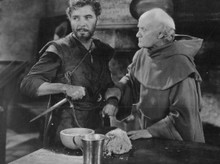 Loading... Please wait...
Loading... Please wait...New Products
Our Newsletter
If I Were King (1938) DVD
Product Description
If I Were King (1938)
Director:
Frank LloydWriters:
Justin Huntly McCarthy (play), Preston SturgesStars:
Ronald Colman, Basil Rathbone, Frances Dee
If I Were King is a delightful costume adventure tale set in 14th century France, during the reign of Louis XI, and inspired by the legend of the rebel poet François Villon, whose exploits were filmed earlier as The Beloved Rogue (1927) with John Barrymore, and later transformed into the musical The Vagabond King on Broadway and onscreen. The movie opens with Paris surrounded by the forces of the Duke of Burgundy, whose armies have laid siege to the city in hopes of starving out King Louis XI (Basil Rathbone, in a riveting performance), a wily, cruel monarch who distrusts all around him -- mostly, however, Burgundy has succeeded in forcing Louis to hunker down and in starving the common people of Paris, whose well-being their king can't be bothered about. The one man in Paris with the courage to raise a hand to ease the suffering is François Villon (Ronald Colman), a gifted poet and glib orator who understands the common people far better than Louis. We first meet him leading a raid on the king's storehouse for sorely needed food and wine. Pursued by the king's guards, he accidentally crosses paths with Louis himself -- trying to uncover a nest of traitors -- at a tavern, and is captured. Louis would normally have Villon put to death without a second thought, but the rebel poet has done him the service of killing a treasonous officer, and has also piqued the king's interest with his notion of inspiring loyalty rather than fear in his subjects. The king also wishes to show Villon that it isn't always easy, even with all of the power of the crown on one's side, to rule a kingdom, or even the capitol city of a kingdom. Louis appoints Villon to the post of Constable of France, in command of all military and police authorities, and nominally in charge of the army, and leaves it to him to do his job -- with the provision that, at the end of a week in so powerful a position, Villon will, indeed, hang. Villon does a very good job of dispensing justice in a way that makes his followers love the king, and even turns one traitor into a loyalist. He is less successful at getting the titled nobility on his side, or the generals to rally their armies for the task at hand, breaking the siege, and is further distracted from his task by his romantic entanglements, with Ellen Drew as the girl of the streets who loves Villon andFrances Dee as the lady-in-waiting to the queen who has stolen his heart. Director Frank Lloyd uses the same sure hand that propelled his Oscar-nominated Mutiny on the Bounty (1935) to weave together the telling of this lusty and witty tale (from a clever screenplay by Preston Sturges, who added his own translations of Villon's poetry to the original script); but the real interest for most viewers will reside with the sparks that fly from the performances of Colman and Rathbone as the two equally matched antagonists, each toying with the other's perceived weaknesses (especially their vanity) while, in his way, secretly admiring elements of the other's character. In the end, Sturges' script cleverly interweaves their common interests, Villon realizing that he must save Paris in order to keep from losing his head.
Here is the link to the movie at the Internet Movie database: http://www.imdb.com/title/tt0030265/?ref_=fn_al_tt_1
Currency Converter
Choose a currency below to display product prices in the selected currency.


















